news
Economy Reform : All exchange rate segmentation is “abolished with immediate effect,” Says CBN Director
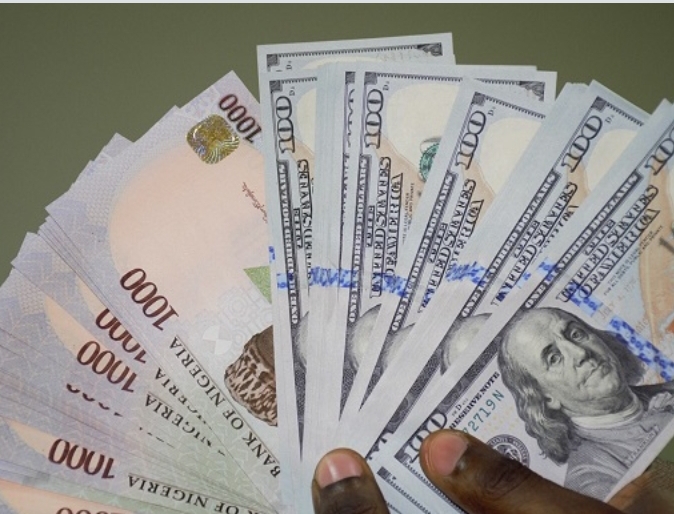
 …Market-driven currency regime excites financial experts
…Market-driven currency regime excites financial experts
The Central Bank of Nigeria (CBN) yesterday unified all exchange rates within the economy into the Investors and Exporters (I&E) window.
In a circular to authorised dealers signed by CBN Director, Financial Markets, Angela Sere-Ejembi, the regulator said all exchange rate segmentation is “abolished with immediate effect”.
The CBN said all segments of the foreign exchange market are now collapsed into the I&E window.
It added that applications for medicals, school fees, Business Travel Allowance/Personal Travel Allowance and SMEs would continue to be processed through the I&E window.
Experts spoken to by our correspondence welcomed the development, saying it will remove corruption, increase Forex inflow and boost economic development.
The apex bank action is in line with the directive by President Bola Ahmed Tinubu in his inauguration day speech, which was yet to be carried out by suspended CBN Governor Godwin Emefiele before he was edged out of office last week.
Emefiele is currently under probe for his conduct during his nine years in office.
Under Emefiele, the CBN resisted the pressure from World Bank and the International Monetary Fund (IMF) that the naira should be floated to determine its real value and eliminate the corruption embedded in the multiple exchange rates regime.
In the circular, the CBN also said that the operational changes to the foreign exchange market include the re-introduction of the “Willing Buyer, Willing Seller” model at the I&E Window.
“Operations in this window shall be guided by the extant circular on the establishment of the window, dated 21 April 2017 and referenced FMD/DIR/CIR/GEN/08/007.
“All eligible transactions are permitted to access foreign exchange at this window,” it stated.
According to the circular, all operational rates for all government-related transactions shall be the weighted average rate of the preceding day’s executed transactions at the I&E window, calculated to two decimal places.
“Proscription of trading limits on oversold FX positions with permission to hedge short positions with OTC futures limits on overbought positions shall be zero.
“Re-introduction of order-based two-way quotes, with bid-ask spread of N1. All transactions shall be cleared by a Central Counter Party (CCP).
“Re-introduction of Order Book to ensure transparency of orders and seamless execution of trades.
“The operational hours of trades shall be from 9 am to 4 pm, Nigeria time,” the circular said.
Also, there is a cessation of the RT200 Rebate Scheme and the Naira4Dollar Remittance Scheme, with effect from 30 June 2023.
Market-driven naira value excites financial experts
The Finance and economic experts, who welcomed the floating of the Naira are the President, the Association of Capital Market Academics, Prof. Uche Uwaleke; Chief Executive Officer, Centre for the Promotion of Private Enterprise [CPPE], Mr Muda Yusuf; Fiscal Policy Partner and Africa Tax Leader, PwC, Taiwo Oyedele; Chief Economist, PwC Nigeria, Andrew Neven; Managing Director, Arthur Steven Asset Management, Mr Olatunde Amolegbe; and President, Association of Bureaux De Change Operators of Nigeria (ABCON), Alhaji Aminu Gwadabe.
Others are Senior Credit Research Analyst, REDD Intelligence, Mark Bohlund; former Executive Director, Keystone Bank, Richard Obire; Director General, Manufacturers Association of Nigeria (MAN), Mr Segun Ajayi-Kadiri; Financial analysts, Renaissance Capital, Charles Robertson; and Managing Director, SD & D Capital Management Limited, Mr Gbolade Idakolo.
Uwaleke, who said that the unification of exchange rates would lead to “ a more transparent forex market,” however, advised the CBN to implement the policy ”in a way that it would not cause massive distortions in the general price level.”
He said: “The unification of exchange rates should not be a one-step process but should be implemented over a period of time however short it may be. Empirical evidence suggests that reforms are more successful when they are sequenced and implemented in phases. This is against the backdrop of the oil subsidy removal which, taken together, can result in galloping inflation and rising poverty levels. So, while fiscal and monetary policy reforms are welcome, absolute care should be taken to strike the right balance and minimise their unintended consequences.”
Yusuf said the policy would facilitate the mopping up of naira liquidity in the economy in the short to medium term.
That, according to him, will impact positively on inflation outlook and deepen the autonomous foreign exchange market through the liberalisation of inflows from export proceeds, diaspora remittances, multinational oil companies, diplomatic missions, etc.
He added that “the erstwhile foreign exchange policy regime was for all practical purposes, a fixed exchange rate regime that created distortions and negative outcomes.”
Yusuf said the distortions included “widening the gap between the official, other multiple windows and parallel market exchange rates, collapse of liquidity in the foreign exchange market and high demand for forex .”
He added: “It is important to reiterate that this is not a devaluation policy, it is a normalisation of the foreign exchange policy regime and an adjustment of rate to reflect the fundamentals of demand and supply. It would be dynamic, and the naira will appreciate or depreciate depending on the fundamentals.”
The expert advised the CBN to ”position itself for periodic intervention in the forex market, as and when necessary.”
Oyedele said the decision was a positive move that should bring more benefits than pains to the economy.
He outlined that with the market-driven rate, the aggregate demand for forex across markets should reduce as round-tripping incentive is removed, noting that avenues for corruption such as people who fake foreign travels just to get forex at discounted rates would be.
“Also, Nigeria’s sovereign credit rating should improve if this is complemented with the right fiscal and monetary policies thereby attracting more forex inflows and lowering the cost of borrowing,” Oyedele said.
In a 10-point impact analysis, Oyedele explained that while the decision expectedly would have some negative implications, the overall impact would be positive for the economy, government revenue and the capital market.
Neven expressed support for the policy as it would remove uncertainties and ensure transparency in the forex market.
“We had stated in a report to the CBN that as long as we don’t have a unified exchange rate, and there is a lack of transparency, nobody will invest in Nigeria. We will continue to have insufficient investment and growth and consequently remain poor. What we said years ago came to pass.
”During the (Muhammadu) Buhari Administration, the average growth rate was 1.5 per cent and the population growth was 2.7 per cent. So, it is a necessary condition to get enough investment into the country when we have a unified exchange rate.
“A situation where you have multiple exchange rates, where you don’t know how to have access to foreign exchange or at what price, simply is unworkable. Any system where you have to go to the CBN in order to access foreign exchange or get approval simply isn’t going to work. That is what has been proved over the last decade.
“I think the reaction to President Tinubu’s inauguration statement was very positive, and this latest statement is very positive. We view these as a necessary step toward economic recovery in Nigeria. We’re very much in favour of the unification of the exchange rate,” Neven said.
Ajayi-Kadiri said it was a “positive development and an indication of a far-sighted strategic choice”.
He said the policy, among other range of fiscal measures to promote domestic manufacturing, was borne out of a deep reflection on the current inclement manufacturing environment and the need to stop the drift into inglorious de-industrialization of the Nigerian economy.
The MAN chief, however, said in addition to pursuing the unification of the exchange rate, the CBN should be prevailed upon to take effective action to give priority to the allocations of forex to the productive sector, particularly to manufacturers to import raw materials, spares, and machinery that are not locally available.
Also, Amolegbe said the market-driven rate was another painful reform that needed to be done noting that the multiple exchange rate regime was not doing the economy any good.
“Not only did the former multiple exchange rate system discourage the inflow of much-needed foreign investments, but it also encouraged massive corruption. Harmonizing the rates should lead to better price discovery and hopefully lead to more transparent commerce. That is why the markets responded to it positively,” Amolegbe, a former president of the Chartered Institute of Stockbrokers (CIS) said.
Gwadabe said the removal of the rate cap would allow a true market clearance rate which has been the agitation of several stakeholders in the economy.
He said the move will harness and increase various sources of supply of dollars into the economy like foreign portfolio investment, foreign direct investment, diaspora remittances, and export proceeds, among others.
“The new directive, in my opinion, is to checkmate various illegal economic behaviours like rent-seeking, currency substitution, forex holding positions and frivolous demand in the market,” Gwadabe said.
Obire said eradicating multiple exchange rates would bring about increased dollar supply, and exchange rate stability.
Also, Bohlund said the unification would help the federal government to better balance its books as it is still highly dependent on dollar-linked oil revenue while spending is in naira.
While Robertson said that “Nigeria has become investable again, adding that attracting foreign money is wise when local savings are in short supply.”
Idakolo said the floating of the naira would lead to a free market system that allows market forces to determine the rate.
“This would allow availability to determine the rate and eliminate hoarding,” Idakolo said.
He added that the development “would also encourage foreign direct investment into the economy as restrictions limiting free flow has been lifted. In the long run, as the economy becomes stronger, the naira would begin to appreciate against the Dollar and the economic activities would now determine the strength of our currency going forward.”
news
NDDC Prepares for Agric Summit, Meets Stakeholders, Says MD

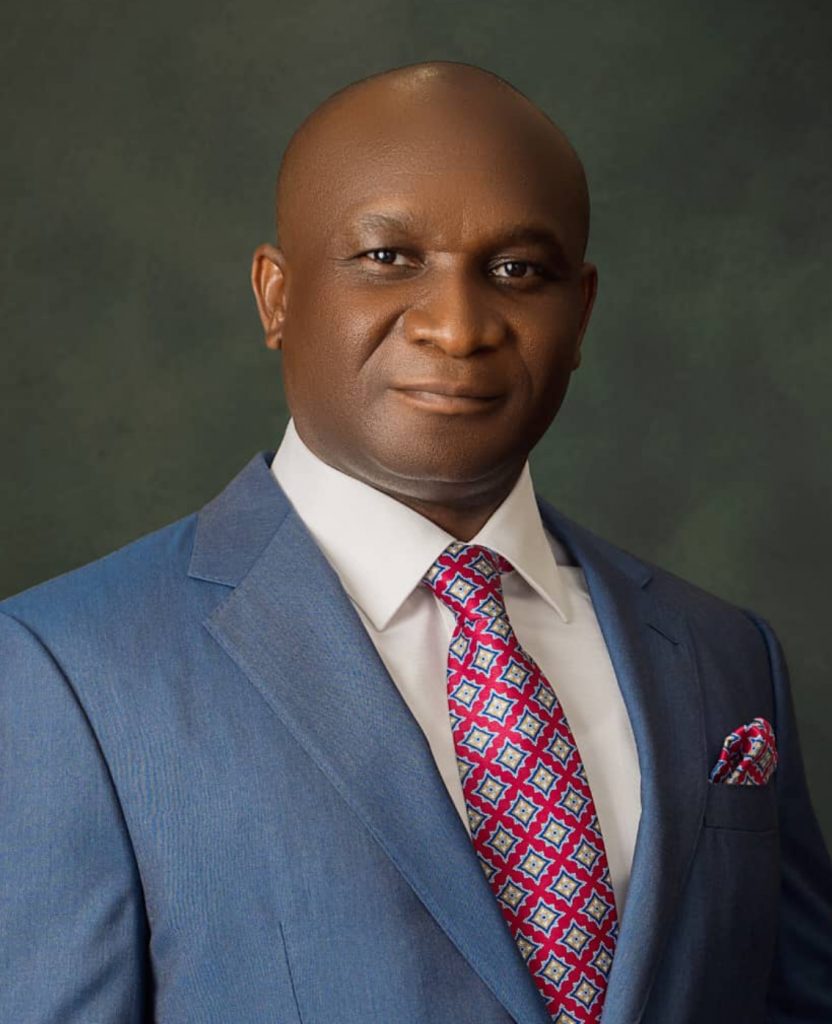 The Niger Delta Development Commission, NDDC, is hosting a two-day strategic meeting with commissioners, permanent secretaries, and directors of agriculture, fisheries & livestock in the nine Niger Delta states.
The Niger Delta Development Commission, NDDC, is hosting a two-day strategic meeting with commissioners, permanent secretaries, and directors of agriculture, fisheries & livestock in the nine Niger Delta states.
The meeting, which kicks off on Thursday in Port Harcourt, Rivers State, would be addressed by the NDDC Managing Director, Dr Samuel Ogbuku, who is expected to outline his plans for a retreat and agricultural summit for the Niger Delta region in line with President Bola Ahmed Tinubu administration’s agrarian programme.
An invitation extended to the stakeholders by the NDDC Director of Agric and Fisheries, Dr Winifred Madume, stated that the Commission was determined to make the Renewed Hope Agenda of the Federal Government a reality in the Niger Delta region by ensuring food security for the people.
Recall that the NDDC Chief Executive Officer had earlier assured that the Commission would align with the President’s vision for agriculture, to ensure that agriculture served as a platform for peace and security in the Niger Delta region.
Ogbuku promised: “Any time from now, the NDDC will convene a mini-agricultural retreat for state governments and commissioners of agriculture. States in the region have their various areas of strength in agriculture. We aim to establish regional agricultural integration, which will later evolve into a regional agricultural summit where a comprehensive master plan for the region’s agriculture will be developed.”
The Managing Director affirmed that the NDDC was engaging all stakeholders to ensure harmony and cooperation in developing the hitherto neglected Niger Delta region.
Reflecting on the Federal Government’s agricultural policies, Ogbuku stressed the need to bring them home to the Niger Delta region, noting that the NDDC would continue to promote policies and programmes that enhance food security and poverty reduction in the states .
news
Update : Tinubu approves 15% import duty on petrol, diesel, aimed to protect local refineries
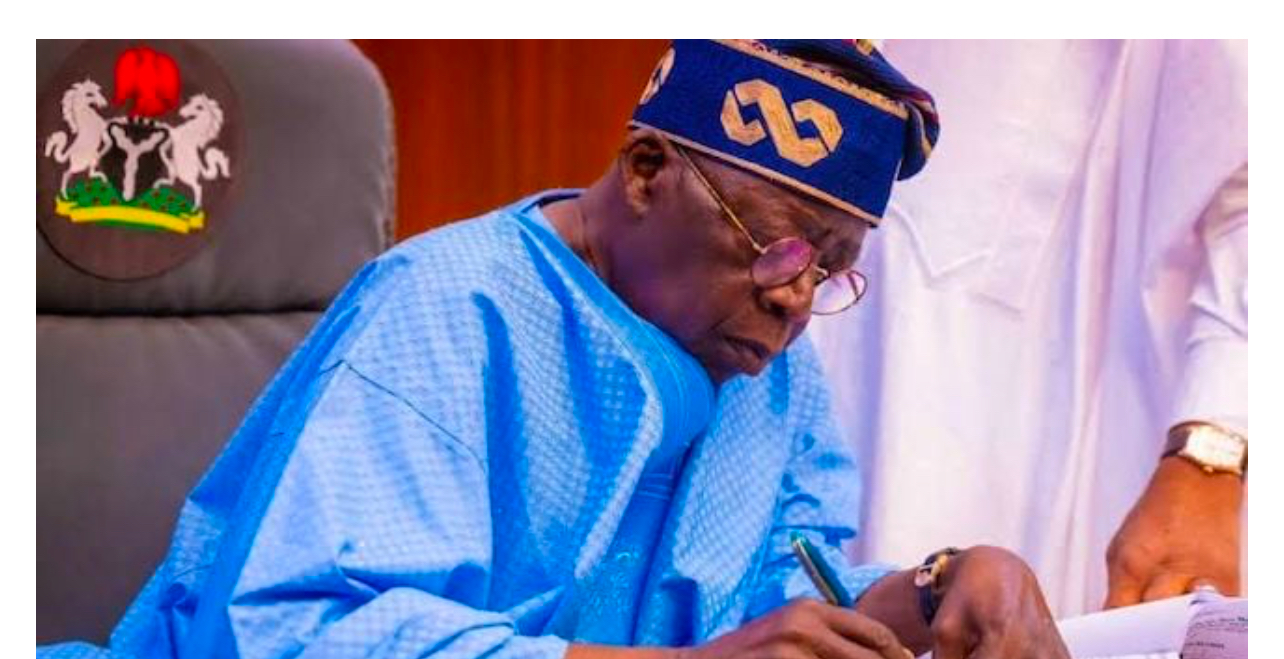
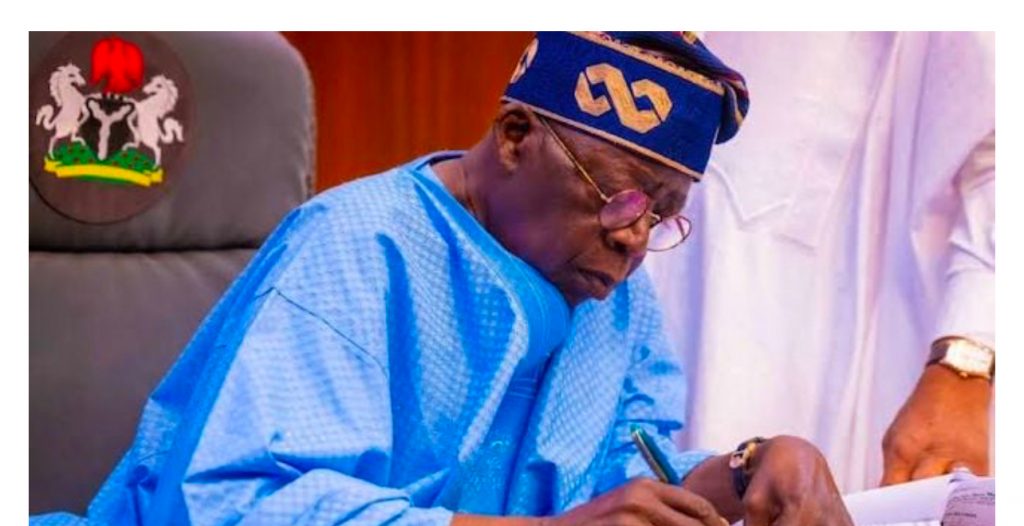
President Bola Tinubu has approved the introduction of a 15 per cent ad-valorem import duty on petrol and diesel imports into Nigeria.
The initiative is aimed at protecting local refineries and stabilising the downstream market, but it is likely to raise pump prices.
In a letter dated October 21, 2025, reported publicly on October 30, 2025, and addressed to the Federal Inland Revenue Service and the Nigerian Midstream and Downstream Petroleum Regulatory Authority, Tinubu directed immediate implementation of the tariff as part of what the government described as a “market-responsive import tariff framework.”
The letter, signed by his Private Secretary, Damilotun Aderemi, and obtained by our correspondent on Wednesday, conveyed the President’s approval following a proposal by the Executive Chairman of the FIRS, Zacch Adedeji.
The proposal sought the application of a 15 per cent duty on the cost, insurance and freight value of imported petrol and diesel to align import costs with domestic market realities.
Adedeji, in his memo to the President, explained that the measure was part of ongoing reforms to boost local refining, ensure price stability, and strengthen the naira-based oil economy in line with the administration’s Renewed Hope Agenda for energy security and fiscal sustainability.
“The core objective of this initiative is to operationalise crude transactions in local currency, strengthen local refining capacity, and ensure a stable, affordable supply of petroleum products across Nigeria,” Adedeji stated.
The FIRS boss also warned that the current misalignment between locally refined products and import parity pricing has created instability in the market.
“While domestic refining of petrol has begun to increase and diesel sufficiency has been achieved, price instability persists, partly due to the misalignment between local refiners and marketers,” he wrote.
He noted that import parity pricing- the benchmark for determining pump prices, often falls below cost recovery levels for local producers, particularly during foreign exchange and freight fluctuations, putting pressure on emerging domestic refineries.
Adedeji added that the government’s responsibility was now “twofold, to protect consumers and domestic producers from unfair pricing practices and collusion, while ensuring a level playing field for refiners to recover costs and attract investments.”
He argued that the new tariff framework would discourage duty-free fuel imports from undercutting domestic producers and foster a fair and competitive downstream environment.
According to projections contained in the letter, the 15 per cent import duty could increase the landing cost of petrol by an estimated N99.72 per litre.
“At current CIF levels, this represents an increment of approximately 99.72 per litre, which nudges imported landed costs toward local cost-recovery without choking supply or inflating consumer prices beyond sustainable thresholds. Even with this adjustment, estimated Lagos pump prices would remain in the range of N964.72 per litre ($0.62), still significantly below regional averages such as Senegal ($1.76 per litre), Cote d’Ivoire ($1.52 per litre), and Ghana ($1.37 per litre).”
The policy comes as Nigeria intensifies efforts to reduce dependence on imported petroleum products and ramp up domestic refining.
The 650,000 barrels-per-day Dangote Refinery in Lagos has commenced diesel and aviation fuel production, while modular refineries in Edo, Rivers and Imo states have started small-scale petrol refining.
However, despite these gains, petrol imports still account for up to 67 per cent of national demand.
news
JUST IN: Tinubu decorates Service Chiefs with new ranks
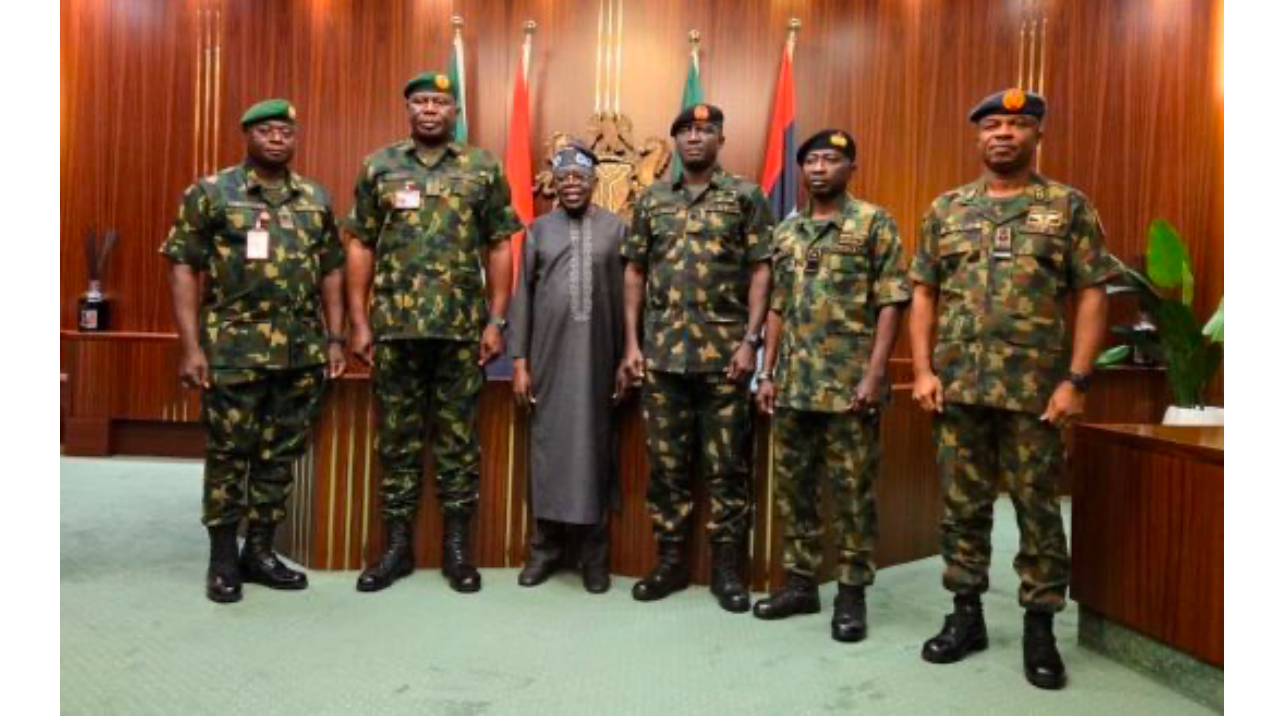
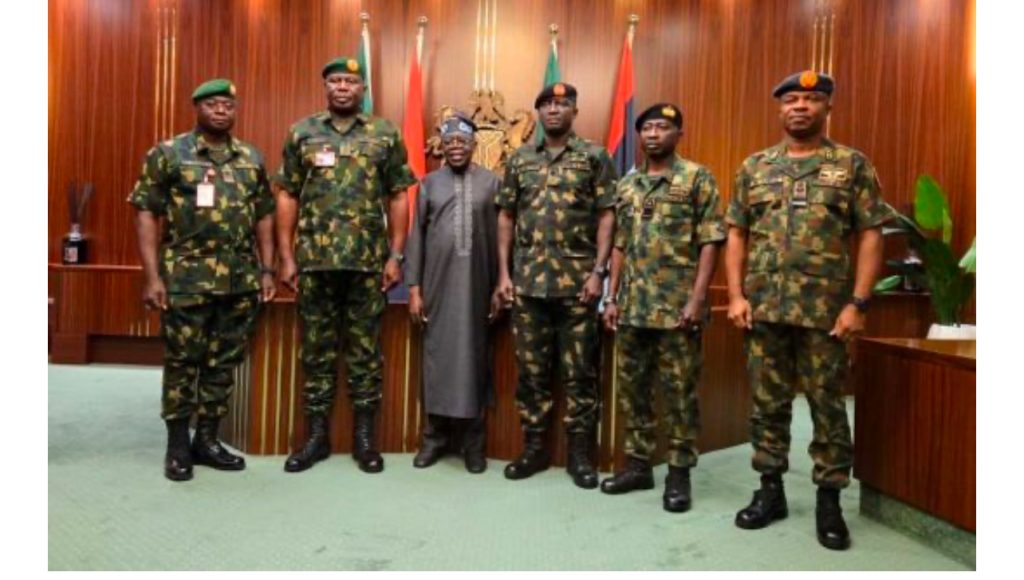
President Bola Ahmed Tinubu has decorated the new Service Chiefs with their new ranks in the military to suit their new positions.
The newly decorated handlers of the nation’s Armed Forces include Lieutenant General, now General Olufemi Olatubosun Oluyede, as Chief of Defence Staff; and Major General now Lieutenant General Emmanuel Undiendeye Undiendeye as Chief of Defence Intelligence (CDI).
Others are Major General, now Lieutenant General Waidi Shaibu as Chief of Army Staff (COAS); Air Vice Marshal, now Air Marshal Kevin Aneke as Chief of Air Staff;
Service chiefs pledge improved security, local arms production, technology use
Tinubu last Friday announced the replacement of the Service Chiefs, a move that has been attributed to the need to refocus and strengthen national security.
While commenting on his action, President Tinubu, in a post on his verified X handle, charged the new military chief helmsmen to “deepen professionalism, vigilance, and unity within our Armed Forces as they serve our nation with honour”.
Tinubu decorates Service Chiefs with new ranks
Tinubu decorates Service Chiefs
President Bola Ahmed Tinubu has decorated the new Service Chiefs with their new ranks in the military to suit their new positions.
The newly decorated handlers of the nation’s Armed Forces include Lieutenant General, now General Olufemi Olatubosun Oluyede, as Chief of Defence Staff; and Major General now Lieutenant General Emmanuel Undiendeye Undiendeye as Chief of Defence Intelligence (CDI).
Others are Major General, now Lieutenant General Waidi Shaibu as Chief of Army Staff (COAS); Air Vice Marshal, now Air Marshal Kevin Aneke as Chief of Air Staff;
Service chiefs pledge improved security, local arms production, technology use
Tinubu last Friday announced the replacement of the Service Chiefs, a move that has been attributed to the need to refocus and strengthen national security.
While commenting on his action, President Tinubu, in a post on his verified X handle, charged the new military chief helmsmen to “deepen professionalism, vigilance, and unity within our Armed Forces as they serve our nation with honour”.
-

 news5 years ago
news5 years agoUPDATE: #ENDSARS: CCTV footage of Lekki shootings intact – Says Sanwo – Olu
-

 lifestyle5 years ago
lifestyle5 years agoFormer Miss World: Mixed reactions trail Agbani Darego’s looks
-

 health5 years ago
health5 years agoChairman Agege LG, Ganiyu Egunjobi Receives Covid-19 Vaccines
-

 lifestyle4 years ago
lifestyle4 years agoObateru: Celebrating a Quintessential PR Man at 60
-

 health5 years ago
health5 years agoUPDATE : Nigeria Records 790 new cases of COVID-19
-

 health5 years ago
health5 years agoBREAKING: Nigeria confirms 663 new cases of COVID-19
-

 entertainment9 months ago
entertainment9 months agoAshny Set for Valentine Special and new Album ‘ Femme Fatale’
-

 news5 months ago
news5 months agoBREAKING: Tinubu swears in new NNPCL Board


